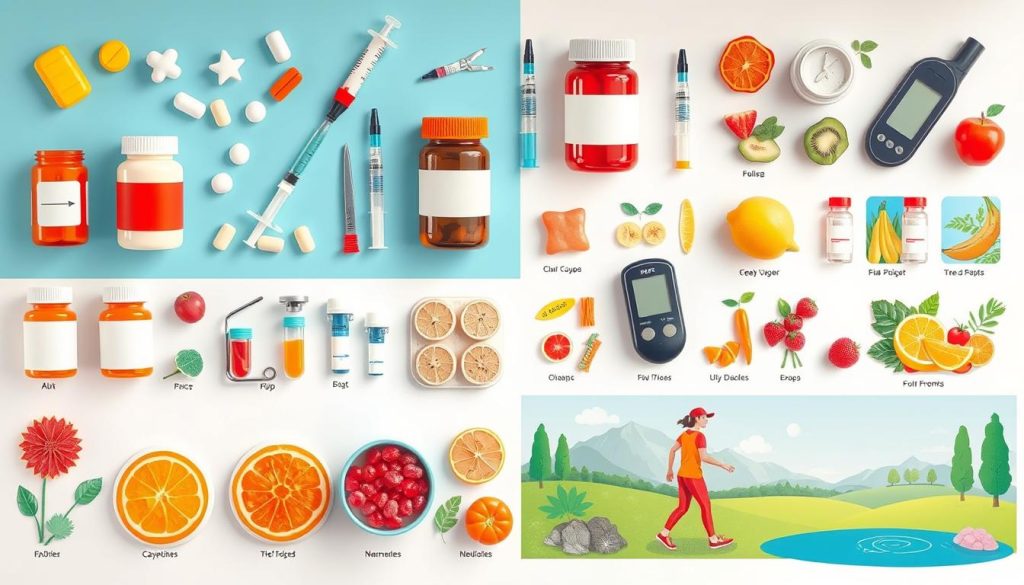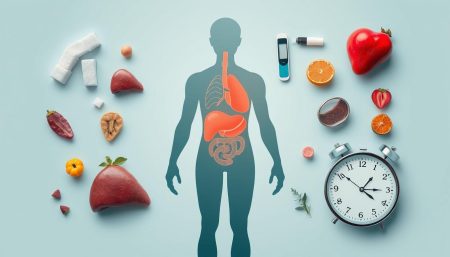Diabetes mellitus is a big challenge for millions around the world. Knowing about diabetes mellitus medications is key for keeping blood sugar levels in check. This guide aims to make diabetes management easier to understand. It focuses on the important medicines that help manage this condition.
This guide covers the newest treatments for diabetes. It explains how each medicine works, when to use it, and its benefits. Whether you’re just starting treatment or looking to change your plan, this guide will help you feel more in control of your health.
An Overview of Diabetes Mellitus
Diabetes Mellitus is a chronic health condition affecting millions globally. It’s mainly split into Type 1 and Type 2 diabetes. Each type has its own way of managing it. Knowing how the body regulates glucose is key to managing diabetes with medication.
Glucose-lowering medications are vital in managing both types of diabetes. They help keep blood sugar levels in check. This prevents complications from high glucose levels.
Type 1 diabetes means the body can’t make insulin, so insulin therapy is lifelong. Type 2 diabetes often needs lifestyle changes and may require medications like insulin to help the body use glucose better.
| Medication Type | Type 1 Diabetes | Type 2 Diabetes |
|---|---|---|
| Insulin | Essential | Sometimes Required |
| Metformin | Not Typically Used | Commonly Prescribed |
| Sulfonylureas | Not Used | Used |
| SGLT2 Inhibitors | Not Used | Increasingly Used |
Managing diabetes well means using glucose-lowering medications along with diet and exercise. Keeping blood glucose levels right is important. It helps manage diabetes daily and prevents long-term health problems.
Navigating Type 1 Diabetes Medications
Managing Type 1 diabetes requires a deep understanding of insulin therapy. It’s about finding the right insulin injection sites and knowing the differences between insulin types. This knowledge is key to daily management.
Understanding Insulin Therapy
Insulin therapy is vital for Type 1 diabetes. It replaces the insulin the body can’t make. Choosing the right insulin and knowing how it works helps keep blood sugar levels stable.
Insulin Injection Sites and Techniques
Where you inject insulin affects how well it works. Common spots include the abdomen, thighs, buttocks, and upper arms. It’s important to rotate sites and take care of your skin to avoid problems and ensure insulin is absorbed well.
Long-acting vs Rapid-acting Insulin
Long-acting insulins are used once a day. They provide a steady insulin level, like the body’s natural insulin at night and between meals. Rapid-acting insulins, given before meals, quickly control blood sugar spikes after eating.
| Type of Insulin | Onset | Peak | Duration |
|---|---|---|---|
| Long-acting | 1-2 hours | No peak | Up to 24 hours |
| Rapid-acting | 15 minutes | 1-2 hours | 3-5 hours |
Knowing how each insulin type works helps patients manage their diabetes better. With the help of healthcare providers, insulin therapy can be tailored to meet individual needs. This leads to better diabetes control and a better quality of life.
Advancements in Type 2 Diabetes Drugs
New medications for type 2 diabetes are making big strides. They improve how well they control blood sugar. They also offer benefits that go beyond just managing blood sugar.
The Role of Metformin
Metformin is a key drug for type 2 diabetes. It helps by reducing how much glucose the liver makes and making insulin work better. It’s also safe, which doctors like.
New Frontiers: SGLT2 Inhibitors and GLP-1 Agonists
New drugs like SGLT2 inhibitors and GLP-1 agonists are changing the game. They not only help control blood sugar but also help with weight loss and heart health. Ozempic, a GLP-1 agonist, works by boosting insulin and reducing hunger.
| Drug Class | Primary Action | Additional Benefits |
|---|---|---|
| Metformin | Decreases hepatic glucose production | Weight management, lower cholesterol levels |
| SGLT2 Inhibitors | Increases glucose excretion in urine | Weight loss, blood pressure control |
| GLP-1 Agonists | Enhances insulin secretion | Appetite reduction, cardiovascular benefits |
The world of type 2 diabetes drugs is evolving fast. This change brings more effective ways to manage the disease. It means better lives for those with diabetes.
Integrating Diabetes Mellitus Medications into Daily Life
Managing diabetes with medication is more than just knowing your list. It’s about making these meds a part of your daily routine. Taking your meds as directed is key to keeping blood sugar in check. It helps avoid serious health issues and improves your life quality.
Working with your healthcare team is important. They help make sure your meds work well and adjust them as needed. Here are some tips to help you stick to your diabetes medication plan.
- Set daily reminders on your phone or use a medication taking app.
- Keep a written schedule in a visible place, such as on your refrigerator door.
- Use pill organizers that feature compartments for different times of the day and week.
Timeliness in taking your meds is very important. Taking them at the same time every day helps keep the right amount of medicine in your body. This helps manage your blood sugar levels effectively.
It’s also important to know how your diabetic medication list works with food, other meds, and exercise. Here’s a table that shows how to use common diabetes meds:
| Medication | Best Time to Take | Notes |
|---|---|---|
| Metformin | With meal (breakfast) | Helps reduce stomach upset |
| Glipizide | 30 minutes before a meal | Controls blood sugar spikes after meals |
| Insulin (long-acting) | Before bedtime | Maintains consistent glucose levels overnight |
Regular check-ups with your healthcare team are vital. They help adjust your treatment plan as needed. This ensures your meds stay effective and your health improves.

The secret to managing diabetes meds is making them a part of your daily life. Personalized care and proactive health management are key. Knowing and organizing your meds empowers you to live a healthier life with diabetes.
Oral Hypoglycemic Agents and How They Work
It’s important to understand how oral hypoglycemic agents work to manage diabetes. These medicines are key in the diabetic medication list. They help control blood sugar levels by affecting the body in different ways.
Sulfonylureas and Meglitinides
Sulfonylureas and meglitinides are important in treating diabetes. They make the pancreas produce more insulin. Both types of drugs help start insulin production, but meglitinides work faster and for a shorter time. This makes them great for managing blood sugar after meals.
DPP-4 Inhibitors and Their Effect on Blood Glucose
DPP-4 inhibitors are a newer type of oral hypoglycemic agent. They help keep blood sugar levels in check by making incretin hormones last longer. These hormones help the body make more insulin when we eat. This leads to better control of blood sugar after meals.
| Medication | Class | Primary Function |
|---|---|---|
| Glyburide | Sulfonylurea | Increases insulin secretion |
| Repaglinide | Meglitinide | Stimulates rapid insulin release |
| Sitagliptin | DPP-4 Inhibitor | Prolongs incretin effect |
Diet and Exercise: The Complementary Duo for Medication Efficacy
Managing diabetes with medication is easier when you add a balanced diet and regular exercise. These habits help control blood sugar and improve overall health. They make your treatment plan more effective.
Eating foods low in refined sugars and high in fiber is key. It helps control blood sugar levels. Regular exercise also boosts insulin sensitivity, helping your body manage glucose better.
- Eat a well-balanced diet with plenty of fibers such as fruits, vegetables, and whole grains.
- Incorporate lean protein sources to stabilize blood sugar levels
- Limit the intake of high glycemic index foods to prevent sugar spikes
- Engage in at least 150 minutes of moderate to intense aerobic exercise per week
Controlling your diet and staying active are not just for managing diabetes. They also help prevent serious health problems. So, it’s important to match your diet and exercise with your diabetes medication. This way, you can manage your diabetes more effectively.
| Dietary Focus | Exercise Recommendation | Medication Synergy |
|---|---|---|
| High Fiber Intake | Daily Walking or Cycling | Enhances medication absorption and control over glucose levels |
| Low Glycemic Index Foods | Strength Training Twice a Week | Improves insulin sensitivity and effectiveness of glucose-lowering drugs |
| Regular Meals | Structured Exercise Program | Regulates blood sugar fluctuations, complementing timed medication doses |
Getting a personalized plan from healthcare professionals is essential. It helps match your diet and exercise with your medication needs. This approach not only boosts medication effectiveness but also supports a healthy lifestyle for the long term.
Selecting the Right Glucose-Lowering Medications
Choosing the right diabetes medications is a mix of knowing your health history, diabetes type, and side effects. Whether you have Type 1 or Type 2 diabetes, or gestational diabetes, your choice matters a lot. It can change your lifestyle and how you manage your health.
Assessing Your Health and Diabetes Type
Starting to pick the right medications means looking at your health and diabetes type closely. Doctors consider your blood sugar levels, how fast your diabetes is progressing, and other health issues. They also think about how well your body makes insulin.
Considering the Side Effects
It’s important to think about side effects when choosing diabetes medications. Each type, like insulin or metformin, can have different reactions. These can be mild, like stomach problems, or serious, like heart issues or bone fractures.
Knowing about these side effects helps create a treatment plan that fits your life and health needs. The aim is to find a balance between controlling blood sugar and avoiding harm to your health.
| Medication Type | Potential Side Effects | Typically Used For |
|---|---|---|
| Insulin | Hypoglycemia, weight gain, injection site reactions | Type 1 and Type 2 diabetes |
| Metformin | Gastrointestinal upset, risk of lactic acidosis | Type 2 diabetes |
| SGLT2 Inhibitors | Urinary infections, dehydration, diabetic ketoacidosis | Type 2 diabetes |
| GLP-1 Agonists | Gastrointestinal issues, rare risk of thyroid tumors | Type 2 diabetes |
The Importance of Regular Monitoring and Adjustment
Managing diabetes well means keeping an eye on it regularly and adjusting diabetes mellitus medications as needed. This helps keep blood sugar levels stable. It’s also key for long-term health and well-being of those with diabetes.
Self-monitoring tools have changed how people manage their health. They let patients check their glucose levels often. This quick feedback is vital for effective diabetes management.
Now, let’s see how regular checks can help with medication management.
| Monitoring Frequency | Impact on Medication Adjustment | Overall Benefit |
|---|---|---|
| Daily | Immediate adjustments to dosages as needed | Prevents extreme fluctuations in blood glucose levels |
| Weekly | Review and modify dosing schedule or medication types | Enhances consistency and effectiveness of medication regimen |
| Monthly | Assessment of long-term efficacy and side effects | Ensures continued health maintenance and adjustments for better outcomes |
Healthcare professionals play a big role in this process. They make expert changes to diabetes mellitus medications based on the data. This teamwork makes sure each treatment plan fits the person’s needs perfectly. It’s not just about sugar levels; it’s about living life fully while avoiding complications.
In the end, regular monitoring, quick medication changes, and expert advice lead to better diabetes management. This means a healthier, more balanced life for those with diabetes.
Comprehensive Diabetic Medication List
Knowing about diabetic medications is key to managing diabetes well. This part explains the list of medications, focusing on insulin therapy. It also talks about the importance of both brand-name and generic drugs.
Brands versus Generics: What You Should Know
Choosing between brand-name and generic drugs affects cost and effectiveness. Brand-name drugs are pricier but come with more support and education. Generics are cheaper and work just as well, with the same active ingredients.
Medication Interactions to Be Aware Of
Understanding medication interactions is vital for effective diabetes care. It’s important to talk to your healthcare provider about all your medications. This includes both diabetes and non-diabetes drugs.
| Medication Type | Brand Name | Generic Name |
|---|---|---|
| Insulin | Lantus | Insulin glargine |
| Sulfonylureas | Amaryl | Glimepiride |
| Biguanides | Glucophage | Metformin |
| DPP-4 inhibitors | Januvia | Sitagliptin |
| SGLT2 inhibitors | Invokana | Canagliflozin |
| GLP-1 agonists | Trulicity | Dulaglutide |
Insulin Pens vs. Syringes and Pumps
Choosing the right tools for insulin therapy is key to managing diabetes well. Insulin pens, syringes, and pumps each have their own benefits and drawbacks. These depend on the patient’s needs, lifestyle, and the best insulin injection sites.
Insulin pens are easy to carry and use, making them popular. They are pre-filled and let you adjust the dose easily. Syringes are cheaper and come in various sizes for more precise doses.
Insulin pumps offer continuous insulin, like the body’s natural insulin. They can be set to give insulin based on meals and blood sugar. This is great for those with busy lives.
| Device | Convenience | Cost | Dose Accuracy | Lifestyle Suitability |
|---|---|---|---|---|
| Insulin Pens | High | Medium | High | Flexible/Active |
| Syringes | Low | Low | Medium | Varied |
| Insulin Pumps | Medium | High | Very High | Active/Controlled |
When picking an insulin delivery method, think about how easy it is to use at different insulin injection sites. This is important for those who are active or need to be discreet. Each device has its own level of portability, ease of use, and fit into daily life.
Choosing between insulin pens, syringes, and pumps should be done with a healthcare professional’s advice. They will consider your medical needs and personal preferences. This helps make insulin therapy more effective and improves your quality of life.
Diabetes Mellitus Medications and Pregnancy
Managing diabetes during pregnancy is a big challenge. It affects both the mother’s health and the baby’s growth. Choosing the right glucose-lowering medications is key. It’s important to know the risks and precautions of each medication during pregnancy.
Risks and Precautions for Gestational Diabetes
Gestational diabetes often starts in the second trimester. It can lead to preeclampsia, cesarean delivery, and babies that are too big. Keeping blood sugar levels in check is vital. This helps avoid complications for both mom and baby.
The first step is diet and exercise. But sometimes, insulin is needed. This is when diet and exercise aren’t enough.
Recommended Medications for Pregnant Women with Diabetes
For women with pre-existing diabetes or gestational diabetes, insulin is best. Insulin doesn’t pass through the placenta, so it’s safe for the baby. Most oral medications are not recommended because they might harm the fetus.
Metformin and glyburide might be okay in some cases. Metformin is sometimes used in women with polycystic ovary syndrome. But insulin is usually the top choice for keeping blood sugar in check.
Managing diabetes in pregnancy needs a team effort. Doctors, endocrinologists, and diabetes specialists work together. They help choose the right treatments and offer support. This team helps ensure a healthy pregnancy for both mom and baby.
Managing Diabetes with Medication During Travel
Traveling with diabetes needs careful planning, mainly for managing diabetes mellitus medications and insulin therapy. Knowing how to adjust your routine and handle emergencies is key for a smooth trip.

Time zone changes can affect your medication schedule, which is important for insulin users. Talk to your doctor to adjust your insulin doses for the new time zone. You might need to slowly change your medication times before you leave.
- Carry a doctor’s note and prescription: Always have a note that explains why you need to carry syringes, insulin pumps, and other supplies.
- Pack extra supplies: Bring extra diabetes mellitus medications and insulin. It might be hard to find the exact type you need while traveling.
- Keep medications with you: Always carry your medications in your hand luggage. This way, you avoid temperature extremes and losing your luggage.
In emergencies, knowing where to find medical help is important. Look up pharmacies and hospitals that know about diabetes mellitus medications. Also, prepare a small medical kit with:
- Glucose monitoring supplies
- Emergency snacks like glucose tablets or gels
- A copy of your medical information and emergency contacts
Keeping your diet in check is also key while traveling. Choose meals that help keep your blood sugar stable. Avoid eating too much of local foods that might upset your blood sugar balance.
Financial Assistance and Cost of Diabetes Medications
Dealing with the cost of diabetes medications and insulin therapy can be tough. It affects both health and finances. Knowing about insurance and financial aid is key to managing these costs.
Insurance Coverage for Diabetes Care
It’s important to understand insurance plans for diabetes care. Most plans offer some coverage, but details vary. Patients should check their insurance to know what’s covered and what’s not.
Programs to Help with Medication Expenses
Many non-profit groups and state programs help with diabetes costs. They aim to support those who can’t afford their medications. Each program has its own rules, like income checks and insurance status.
| Program Name | Type of Assistance | Eligibility Criteria |
|---|---|---|
| Patient Access Network | Covers medication and supply costs | Specific income criteria, varies by state |
| Diabetes Foundation Aid | Provides free insulin and glucose monitoring devices | Lack of insurance coverage for diabetes care |
| Local State Health Assistance | Subsidies on medications, educational resources | Residency requirement, income-based evaluation |
Learning about diabetes and its effects on health is helpful. This includes how it affects hair health. This knowledge can improve diabetes management and help with treatment costs.
Future Directions in Diabetes Treatment and Medication
The world of diabetes treatments is on the brink of big changes. Scientists are working hard to create better, easier-to-use ways to manage diabetes, mainly type 2. They want to not just control blood sugar but also stop the disease from getting worse.
Researchers are diving deep into diabetes to find new medicines. They’re looking at making smart insulin that only kicks in when needed. This could cut down on the risk of low blood sugar. Gene editing, like CRISPR, might also help fix the genetic problems that cause diabetes.
There’s also a push for more personalized care. Using big data and machine learning, doctors can create treatment plans that fit each person’s needs. Technology is playing a big role too, with devices that help monitor and control diabetes better. These advancements aim to make life easier for those living with diabetes.
FAQ
Q: What types of medications are used to treat diabetes mellitus?
A: To treat diabetes mellitus, doctors use many medications. For type 1 diabetes, insulin is key. For type 2, metformin is often used. Other drugs like SGLT2 inhibitors and GLP-1 agonists help control blood sugar levels.
Q: How does insulin therapy work and what are the recommended injection sites?
A: Insulin therapy helps when the body doesn’t make enough insulin. It’s injected into places like the abdomen, thighs, and arms. This helps insulin work better in the body.
Q: What is the difference between long-acting and rapid-acting insulin?
A: Long-acting insulin keeps insulin levels steady for a day. Rapid-acting insulin quickly lowers blood sugar after meals.
Q: How does Metformin work in type 2 diabetes management?
A: Metformin lowers glucose made by the liver. It also makes body tissues more responsive to insulin. This helps absorb glucose better and lowers blood sugar.
Q: What advancements have been made with SGLT2 inhibitors and GLP-1 agonists?
A: SGLT2 inhibitors help the kidneys remove glucose through urine. GLP-1 agonists mimic hormones that boost insulin after eating. Both help lower blood sugar and offer heart benefits.
Q: What strategies can help integrate diabetes medications into daily life?
A: To manage diabetes meds, take them at the same time every day. Use pill organizers and set reminders. Also, talk to your doctor regularly to adjust your treatment.
Q: How do DPP-4 inhibitors and sulfonylureas assist in controlling blood glucose?
A: DPP-4 inhibitors extend the action of incretin hormones, encouraging insulin release. Sulfonylureas make the pancreas produce more insulin. Both help lower blood sugar.
Q: Why is a combination of diet, exercise, and medication important in managing diabetes?
A: Diet and exercise are vital for lowering blood sugar naturally. They improve insulin sensitivity and help maintain a healthy weight. This complements the effects of diabetes medications.
Q: How do I select the right glucose-lowering medication for my diabetes?
A: Choosing the right medication involves looking at your health, diabetes type, and side effects. Talk to your doctor to find a treatment plan that fits your needs.
Q: What should I consider when looking at different insulin delivery systems like pens, syringes, and pumps?
A: Think about convenience, comfort, and accuracy when choosing insulin delivery. Pens are easy to use, syringes are affordable, and pumps offer continuous insulin.
Q: How can pregnancy affect diabetes management and medication needs?
A: Pregnancy changes insulin sensitivity and glucose levels. You may need to adjust your medication. Managing gestational diabetes is critical for your and your baby’s health.
Q: What preparations should I make for managing diabetes with medication during travel?
A: Pack extra supplies and understand time zone changes. Carry medical ID and plan meals to keep your medication effective while traveling.
Q: What are some ways to afford diabetes medications if I’m on a limited budget?
A: Look into insurance, patient assistance programs, and generic meds. State or federal benefits can also help lower medication costs.
Q: Are there any new directions or innovation in diabetes medications on the horizon?
A: Research is ongoing to create better treatments. This includes new drug classes, dual-hormone pumps, and medications with extra health benefits.


















